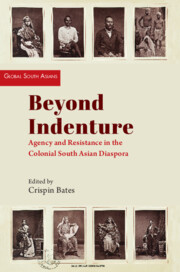Book contents
- Frontmatter
- Dedication
- Contents
- List of Figures and Tables
- Acknowledgements
- Introduction
- I Agency and Resistance
- 1 Negotiating Power in Colonial Natal: Indentured Migrants in Natal, 1860–1911
- 2 Stewed Plums, Baked Porridge and Flavoured Tea: Poisoning by Indian Domestic Servants in Colonial Natal
- 3 Labour Resistance in Indenture Plantations in the Assam Valley
- 4 A Forgotten Narrative of the Satyagraha Campaign: The Treatment of Prisoners between 1907 and 1914
- 5 Toilers across the Seas: Racial Discrimination and Political Assertion among Sikhs in Canada
- II Remigration
- 6 The Remigration of Hindostanis from Surinam to India, 1878–1921
- 7 Not So Anchored: The Remigration of Indians within the Caribbean Region
- 8 On the Move: Remigration in the Indian Ocean, 1850–1906
- III Gender and Family
- 9 Intimate Lives on Rubber Plantations: The Textures of Indian Coolie Relations in British Malaya
- 10 Labouring under the Law: Exploring the Agency of Indian Women under Indenture in Colonial Natal, 1860–1911
- 11 Gujarati ‘Passenger Indians’ in the Eastern Cape since 1900: Business, Mobility, Caste and Community
- 12 The Eurasian Female Workforce and Imperial Britain: Harnessing Domestic Labour by People of Mixed Racial Descent
- IV Legacies
- 13 After the Long March: Colonial-Era ‘Relief’ for Burma Indian Evacuees in Visakhapatnam District, 1942–1948
- 14 Opposing the Group Areas Act and Resisting Forced Displacement in Durban, South Africa
- 15 Indo-Fijians: From Agency to Abjection
- 16 New and Old Diasporas of South South Asia: Sri Lanka and Cyber-Nationalism in Malaysia
- About the Contributors
- Index
6 - The Remigration of Hindostanis from Surinam to India, 1878–1921
Published online by Cambridge University Press: 31 December 2023
- Frontmatter
- Dedication
- Contents
- List of Figures and Tables
- Acknowledgements
- Introduction
- I Agency and Resistance
- 1 Negotiating Power in Colonial Natal: Indentured Migrants in Natal, 1860–1911
- 2 Stewed Plums, Baked Porridge and Flavoured Tea: Poisoning by Indian Domestic Servants in Colonial Natal
- 3 Labour Resistance in Indenture Plantations in the Assam Valley
- 4 A Forgotten Narrative of the Satyagraha Campaign: The Treatment of Prisoners between 1907 and 1914
- 5 Toilers across the Seas: Racial Discrimination and Political Assertion among Sikhs in Canada
- II Remigration
- 6 The Remigration of Hindostanis from Surinam to India, 1878–1921
- 7 Not So Anchored: The Remigration of Indians within the Caribbean Region
- 8 On the Move: Remigration in the Indian Ocean, 1850–1906
- III Gender and Family
- 9 Intimate Lives on Rubber Plantations: The Textures of Indian Coolie Relations in British Malaya
- 10 Labouring under the Law: Exploring the Agency of Indian Women under Indenture in Colonial Natal, 1860–1911
- 11 Gujarati ‘Passenger Indians’ in the Eastern Cape since 1900: Business, Mobility, Caste and Community
- 12 The Eurasian Female Workforce and Imperial Britain: Harnessing Domestic Labour by People of Mixed Racial Descent
- IV Legacies
- 13 After the Long March: Colonial-Era ‘Relief’ for Burma Indian Evacuees in Visakhapatnam District, 1942–1948
- 14 Opposing the Group Areas Act and Resisting Forced Displacement in Durban, South Africa
- 15 Indo-Fijians: From Agency to Abjection
- 16 New and Old Diasporas of South South Asia: Sri Lanka and Cyber-Nationalism in Malaysia
- About the Contributors
- Index
Summary
The Dutch colony of Surinam (present-day Suriname), situated on the northern tip of South America, was one of the last colonies to introduce indentured labour from India. In 1870, after extensive negotiations, the Dutch and British governments signed a 26-article treaty, agreeing to the employment of indentured Indian labourers in Surinam. This Coolie Treaty (Koelietractaat) was not implemented for another three years, and it was only on 5 June 1873 that the ship Lalla Rookh arrived in Surinam with 410 emigrants, having left the port of Calcutta (present-day Kolkata) in February. Within one year (between June 1873 and April 1874), seven ships followed, bringing almost 4,000 Indian emigrants to Surinam. In total, 34,304 Indian emigrants were received across 64 ships between 1873 and 1916. It is important to note that these Indian emigrants remained British subjects in Surinam. Their descendants did not become Dutch subjects by law until 1927, and by that point the majority had been born in the colony. They designated themselves as Hindostanis (‘Hindostanen’ in the Dutch language) in reference to their land of origin – Hindustan being one of the original names for India. Due to their status as strangers in a foreign colony, special arrangements protected them. According to Article 9 of the Coolie Treaty, the Indian labourers indentured to Surinam had the right to a free return passage after five years. It also stated:
If he consents to contract a new engagement he will be entitled to a bounty and will retain his right to return-passage at the expiration of such second engagement. The right of the immigrant to a return-passage extends to his wife, and to his children who quitted India under the age of ten years, as well as to those born in the Colony.
More than a third (11,512) of the 34,304 Indian emigrants returned to British India at the expense of the Dutch government. Yet, significantly, in spite of the gratis opportunity to return, the majority of the emigrants settled permanently in Surinam. They received approximately 5 acres of fertile land free of rent for six years and 100 guilders (equivalent to the cost of the return passage). Furthermore, over a quarter (9,725) of them signed a second contract for an additional five years in Surinam and received an extra premium of 100 guilders. After settling, these Indians and their descendants became successful small farmers in due course.
- Type
- Chapter
- Information
- Beyond IndentureAgency and Resistance in the Colonial South Asian Diaspora, pp. 127 - 149Publisher: Cambridge University PressPrint publication year: 2024



